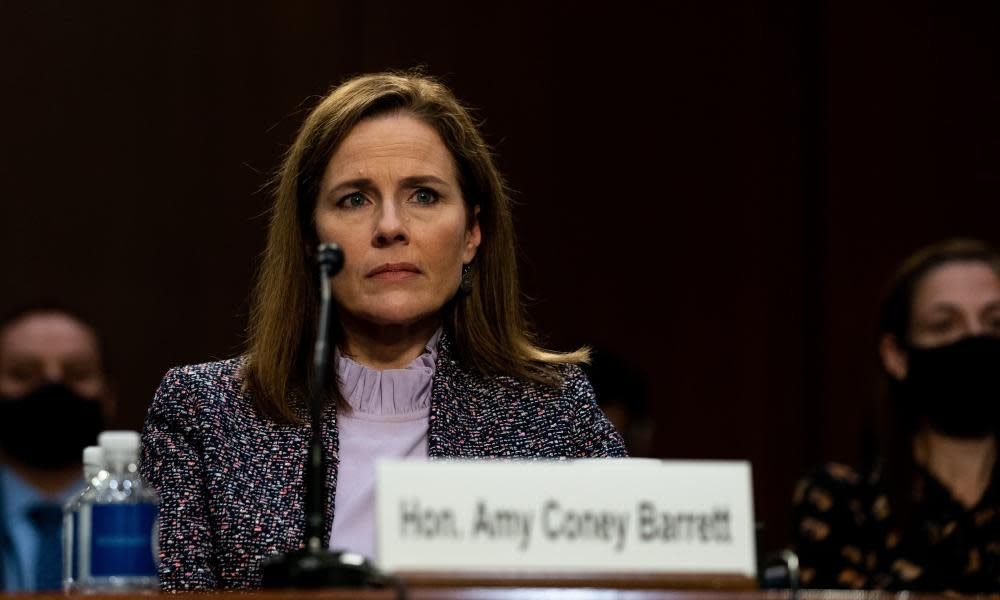Top Senate Republican says he has the votes to confirm Amy Coney Barrett
- Oops!Something went wrong.Please try again later.

The Republican Senate majority leader, Mitch McConnell, said he has the votes to confirm the nomination of conservative Amy Coney Barrett as a supreme court justice as the upper chamber’s judiciary committee scheduled a vote for 22 October to advance the nomination towards a full Senate ballot shortly after.
Barrett’s progression towards taking up the seat vacated by the death of the liberal favorite Ruth Bader Ginsburg now appears virtually assured, but the unprecedented nomination of a new justice so close to a presidential election – and one who will shift the balance of the court rightward – has been contentious.
Barrett raised alarm among Democrats at her confirmation hearings this week for taking an agnostic view on the legality of voter intimidation and on the question of whether a president might unilaterally delay an election, neither of which in the view of experts is a close legal call.
Barrett likewise declined to say whether she would recuse herself from any case that might reach the supreme court that could help decide the November election – though Donald Trump has made clear that one reason he wants her on the court is to help him prevail in such a scenario.
Democrats on the judiciary committee, who are in the minority and who signaled on Thursday that they were out of tools and tactics to stop the Barrett nomination from advancing, additionally expressed concern that Barrett refused to say whether she accepted the science of climate change. She also appeared poised to help vacate the Affordable Care Act and left open the possibility that the watershed Roe v Wade ruling protecting reproductive rights might be overturned.
But with a 53-47 Republican majority in the Senate, McConnell expressed optimism that his caucus would be able to overcome Democratic objections and make Barrett Trump’s third supreme court justice to be installed in just four years. The last president to install justices so quickly was Ronald Reagan, who saw three justices confirmed during his second term in the late 1980s.
“We have the votes,” McConnell told reporters.
Two Republican senators, Susan Collins of Maine and Lisa Murkowski of Alaska, have signaled that they would not back the Barrett nomination, out of concern that it fell too close to a presidential election.
But the rest of the Republicans have fallen in line, including those who objected to a Barack Obama nominee in March 2016 on the grounds that the nomination fell too close to an election being held eight months later.
“This goose appears to be cooked,” Senator Cory Booker, a Democratic member of the judiciary committee, said during deliberations on Thursday preceding witness testimony.
The increasing regularity with which supreme court confirmations were achieved under unusual circumstances pointed to the corrosive presence of outside influences that had hijacked the process for their own purposes, said committee member Sheldon Whitehouse of Rhode Island, a Democrat.
Whitehouse said the refusal by the same committee to consider the Obama nominee Merrick Garland in 2016, and the subsequent refusal by the committee to credit substantial sexual assault allegations against Brett Kavanaugh, Trump’s second nominee, pointed up the deterioration of the process.
He warned that a return to bipartisan comity on the question of future supreme court questions was difficult to envision.
“Republicans shouldn’t think that they will have any credibility if the shoe is on the other foot to come to Democrats and say, ‘Yeah, I know you can do that, but you shouldn’t’,” Whitehouse said.
“That credibility will die if they continue to proceed this way with this supreme court nomination.”

